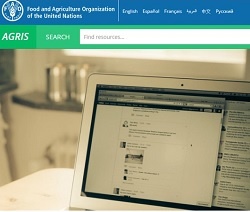Discover AGRIS: International System for AGRICULTURAL SCIENCE and TECHNOLOGY... in Numbers!


1975: AGRIS: the International System for Agricultural Science and Technology was created by the Food and Agriculture Organization (FAO) of the United Nations, in order to provide access to bibliographic information on agricultural science and technology.
As a global public multilingual bibliographic database for agricultural science and technology, AGRIS collects and shares agricultural bibliographic data, free of charge, which enables to retrieve a wealth of research and technical information resources on agriculture worldwide.
AGRIS USE & AGRIS USERS:
… AGRIS provides access to | 9,670,840 bibliographic records (February 2019) breakdown by type as follows:
|
… AGRIS offers links to | 2,500,000 full-text information resources |
… AGRIS is the | 3rd most used FAO.ORG website |
… AGRIS is an international partnership of | more than 400 data providers from up to 145 countries |
… AGRIS is an ongoing collaboration with | |
… AGRIS has had (in 2018) | 8,600,000 page views |
… AGRIS has attracted (in 2018) | 5,600,000 users |
By taking advantage of Semantic Web capabilities (the AGRIS Open Data Set is available for re-use as a Linked Open Data under the international CC-BY IGO 3.0. license), through its core bibliographic data, AGRIS-related content across online information systems is retrieved.
AGRIS is a global public good and is a responsive service to its user needs by facilitating contribution and feedback regarding the AGRIS core knowledge base and its continuous development.
The use and access of AGRIS is subject to the AGRIS acceptable use policy (please read also FAO Copyright Policies).
By submitting data to AGRIS, every data provider accepts that bibliographical data describing its information resources will be visible worldwide through the AGRIS platform.
Since the content of AGRIS falls under the main areas of work of FAO, it is indexed by the AGROVOC multilingual thesaurus which covers all areas of FAO's interest including food, nutrition, agriculture, fisheries, forestry, environment and other related topics.
For more detailed information about AGRIS data collection and data processing please check the dedicated AIMS.FAO.ORG AGRIS page and the AGRIS.FAO.ORG official website. |
>> In case of further questions, please check Agris page.
>> To stay up to date with AGRIS news, you are welcome to join AGRIS discussion group on DGroups
Want to learn more about AGRIS? You are invited to take a look at:
- AGRIS: Providing Access to Bibliographic Information on Agricultural Science and Technology
- AGRIS content coverage: facilitating access to global agricultural literature
- Enabling Multilingual Search through Controlled Vocabularies: the AGRIS Approach
- AGRIS: providing access to agricultural research data exploiting open data on the web
- The role of AGRIS in providing global agricultural information to boost productivity and food security
- Discovering, Indexing and Interlinking Information Resources
- Mining the web to make hidden agricultural research globally discoverable: the AGRIS case
- AgroTagger classifier. Leveraging the knowledge encoded in AGROVOC for AGRIS items
- Discover AGROVOC multilingual Thesaurus of the Food and Agriculture Organization of the UN (FAO)... in Numbers!
To keep up-to-date with AIMS news, please, Sign up for AIMS news, follow @AIMS_Community on Twitter. And, thanks again for your interest!

